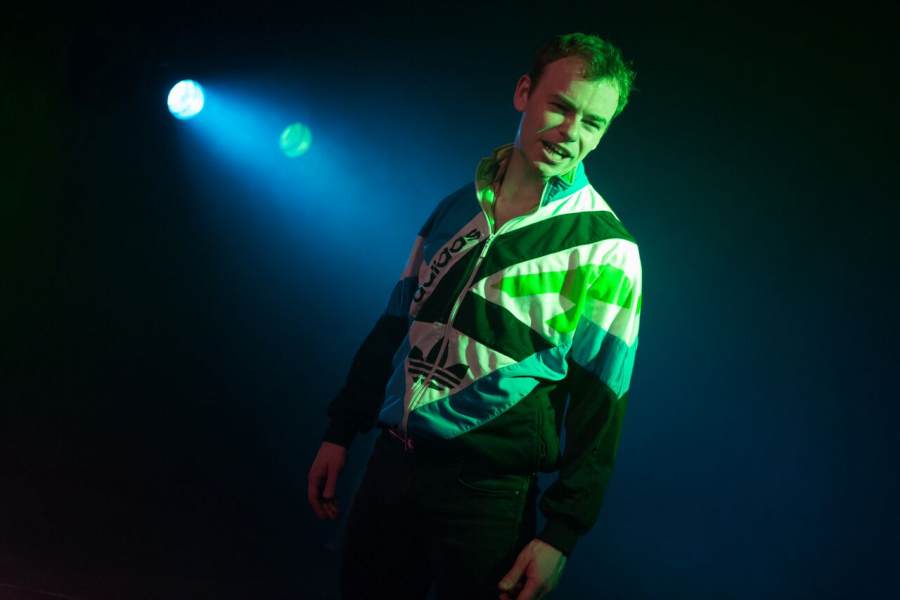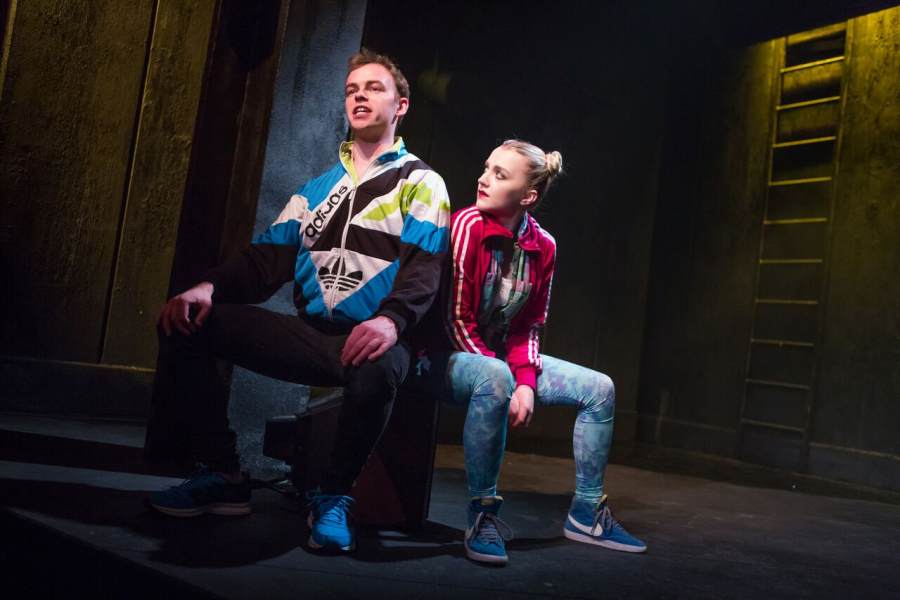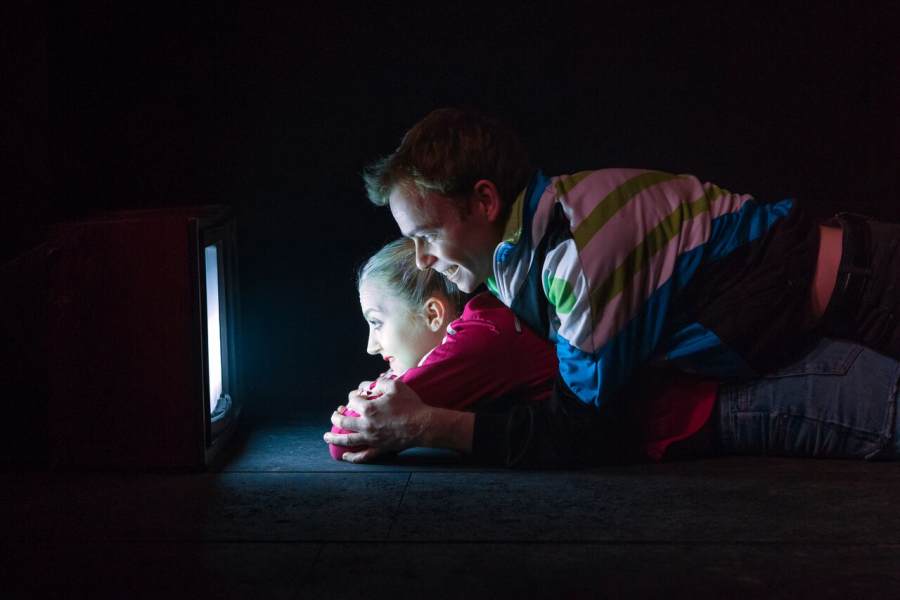

Colin Campbell is an exciting young actor from Ireland who is making his New York City debut in Disco Pigs, the fast-paced, surreal punk language play that launched the career of Enda Walsh two decades ago. A successful London run has brought this remounting to New York City for a run at the Irish Repertory Theatre. Colin is absolutely charming and thoughtful, and clearly cares deeply about his work. We chatted about the play and about his life as an actor in a freewheeling conversation that is sure make you run to see the show and hope he comes back to grace our stages soon.
Colin Campbell, thank you so much for speaking with me. I just saw you in the excellent remounting of Disco Pigs, the popular Enda Walsh piece that is getting a two-decade remounting. What was it like to perform in this contemporary piece, with such a great reputation, that launched this playwrights career?
It’s fantastic. I love the play, since I first encountered it years ago. So to get the chance to perform it, and to show it to London audience, now a New York audience, it’s really great.
When did you first encounter the play?
I think college. I was doing a different degree all together, I was doing maths at the time. Yeah, I wasn’t really sure what I wanted to do with my life.
Really, what kind of maths?
It was mathematical sciences. And then I’d seen a production of it down in Limerick, a student production in the southwest of Ireland. I remember I went down on my own and, I remember leaving the theater going “what was that?” but I loved it. It was so intoxicating and it was so visceral. The two performers are just sweating (laughs) so I thought I kind of want to do that!
Am I right to assume this was one of the plays that brought you to the theater?
Yeah, it was definitely, it was one of the first times I’d seen a show that wasn’t like anything else I’d expected from the theater. I’d previously, maybe I’d seen maybe one or two theater pieces that were your classic sort of end-on, people in their frocks and all that kind of stuff, and I was a bit bored.
So, when I’d seen that [Disco Pigs], and I thought it was speaking to me and my age group, yeah, I really felt, it felt quite strong and quite relevant. Yeah, it felt, you walked out of theater with a different walk, and you felt a bit more alive. Yeah, it was fantastic, it was a bit of a change, tender experience.

When people walk out of theater for your performance in Disco Pigs, do you want them to sympathize with your character?
I don’t know if sympathy is the right thing, maybe. You want empathy more than anything. To be recognized as a person, I suppose, but they are sort of, as much as they create their own environment, [the characters Pig and Runt] are kind of a victim of their own social circumstances as well. It’s not entirely unexpected that someone from their background can end up going down this sort of dark, dark road. And trying to find a way of expressing themselves.
I think, yeah. You do sympathize with them because they are just trying to find their way in the world, really. They don’t really have any role models, or have the education to go through it. Society expects us to go through these things, so it manifests in other sort of ways.
The characters mature away from each other, and it seems to me while Pig [Colin’s character] is sexually maturing, Runt [the other character, played by Evanna Lynch] is emotionally maturing. How do you read their dynamic?
Yeah, I think that’s a good way of looking at it. I think, yeah, there’s no avoiding the fact that they're different genders, it definitely played into it, and I think men take a while longer to mature emotionally - I’m still trying the best here myself.
Here, here.
I suppose they're reaching a point in their lives, I feel, he’s arguably trying to cement further what they have, and she’s looking to see what’s beyond the world they’ve created. So it’s that crossroad in any sort of friendship.
Especially at that age when you’re perhaps leaving school, or heading off to college, you don’t know what’s next in your life. It can be quite scary.
With that in mind, would you urge 18 year olds or 17 year olds to see this play, is it geared towards them?
Uh, I think everyone can get something out of it. If you were a teenager in the '90s, there’s definitely stuff there, if you’re Irish of Irish heritage or of British heritage the references you’ll get can be quite rewarding. For the little bit of language you’ll understand.
The vocal work was so impressive in the show. I was wondering if it was fluid for an Irish audience.
It worked on different levels for different people, I find. I know a lot of people struggled with the language of it, and that’s ok, I think that I had the same problem.

I think it’s part of the mystery of it.
Yeah, you kind of, you feel, it takes a while to tune into their wavelength. And it’s quite rewarding when you get there, because the show is only, what, an hour, an hour, fifteen minutes long, so it’s sort of ripped away from you and you kind of miss it when it’s all over.
I mean the show - do you ever stop moving in the first twenty minutes?
No, no, there’s been a lot of morning fitness sessions, lately, trying to make sure we’re sharp enough to do the show. We don’t party too much afterwards, you’re kind of exhausted.
Has the physicality of the performance been a challenge? Has it been fun?
Yeah! It’s been both. There’s definitely days and rehearsal where we push ourselves quite a bit and we kind of go beyond breaking point to find where else we can possibly go to. But yeah, it’s such a delight to do it, it really allows you to show off and show your different skills - vocally, physically, emotionally, it’s all there - so it’s kind of a treat for an actor to get a crack at.
How old are you, Colin, if you don’t mind me asking?
I’m 28 now, so I’m, like, way beyond what these people have gone through probably now.
No no no, you still access this naïveté, passion--
Yeah, I think that’s a sign of my own lack of maturity (laughs), which is a good thing for the character.
Would you take three seconds to describe your performance career?
Oh, performance career, that’s hard. It’s been fun. It’s been an education. It’s hopefully going to keep going for a time.
I don’t see why it can’t.
It’s been great, I’ve been lucky to work in Dublin, and at a few good shows back home, in all different varieties and styles. I’ve been doing naturalism and commedia style, and something physical like this now in London and New York. I’ve been able to test myself in a lot of different roles.
Is being a young actor any different in Ireland or England any different than it is here? I mean, do you have a sense of what’s it like being a young actor in New York City?
Yeah, well, because Dublin is such a small town, everyone knows what’s happening. It’s just the fact that there is so few shows going on you might have to wait a lot to get an opportunity to audition. Whereas if you’re here, or in the UK, there’s more opportunities to be told no (laughs). Which is enjoyable, invigorating.
Yeah there’s all the same sort of struggles where you’re trying to get an agent, you’re trying to get a chance to work, to perform, to do what you do, what you love doing.
I know you just began the Disco Pigs run here, but have you noticed any difference between London audience and the New York audience?
Yeah, well, we mention Baywatch in the play, so that always gets a laugh, it’s stronger here. But there’s other cultural references that are lost. But you can feel that we’re talking at ourselves “what does it all mean.” And it’s always great when you hear an audience is silent, it means that they’re really listening, they’re not getting the references, or some of the language stuff, or our accents, they’re really fighting to stay with us, which is all you can really ask for.
I think you used the exact right word: tuning in. When I saw it the other day, I felt the house tuning in with you as we were getting to know the language and dynamics. Do you do vocal work for the roles?
Yeah, we did a bit. We would listen to local radio, and working with coaches, and listening to people from Cork. For me, I was familiar enough with the accent myself, when I was in college in Leer we worked on Cork accents as well, so you remember little things.
The play is written in such a stylized language that it forces you to speak like it. It’s a little bit, it’s not as tricky as other plays, where you might get a flat line of regular language, where you have to articulate unless you will fall off.
I think Enda Walsh, his profile is growing over here, he just had a show at New York Theater Workshop, he had his Broadway show that did very well. What was it like being in one of his plays, what’s his reputation like over there?
Yeah, he’s sort of a tour-de-force back home. He’s quite prolific as well. He does maybe a show every other year the past couple years at the Galway Arts Festival. It’s his own style, which is so powerful and growing all the time.
At the Galway Arts Festival he has these massive warehouses where the shows go on, and you might see only one or two actors on stage, and they're vocally and physically killing themselves on stage, and it’s all for us. It’s quite amazing. And it’s great to be able to work on (laughs) an Irish playwright that’s alive.
Ha!
He’s quite fantastic, and a lovely guy, he came in to see us at one of our previews, and he seemed to be quite happy, which is beyond any review that really matters.
Cillian Murphy was the original Pig, did you study his performance of it?
No, we deliberately didn’t watch the movie, we watched it afterwards, after the London run, we had a little party and said “well, let’s watch it and see what it’s like” and the film, it’s very different, obviously, and the narrative is actually quite different but you also can’t, you can’t do the same things that you can in the theater that you can on film, and vice versa. So obviously he’s one of our celebrated actors so it’s great to share what he created all those years ago.
And I thought that you brought an excitement to the character that was exciting for me to see on stage. Are there any actors or artists, playwrights, whatever, that you admire that you’d like to share with us?
Yeah, I suppose back home I love watching actors like the people at the Druid Theatre Company, they do great work. Landmark Theatre Productions who are over here with Enda Walsh’s next show Ballyturk that’s going to be on at St. Ann’s Warehouse. Corn Exchange Theatre Company. The stuff that goes on at the Abbey Theatre now, they’ve new artistic directors there, so it’s quite exciting. And the Gate Theatre as well.
That’s the home front. I prefer just walking into the theater not knowing anything about actors, so I’m kind of looking forward to seeing shows over here with people who are not the names, who are top people.
That’s awesome. You promise to come back to New York City to perform for us all again?
If you’ll have me, absolutely.